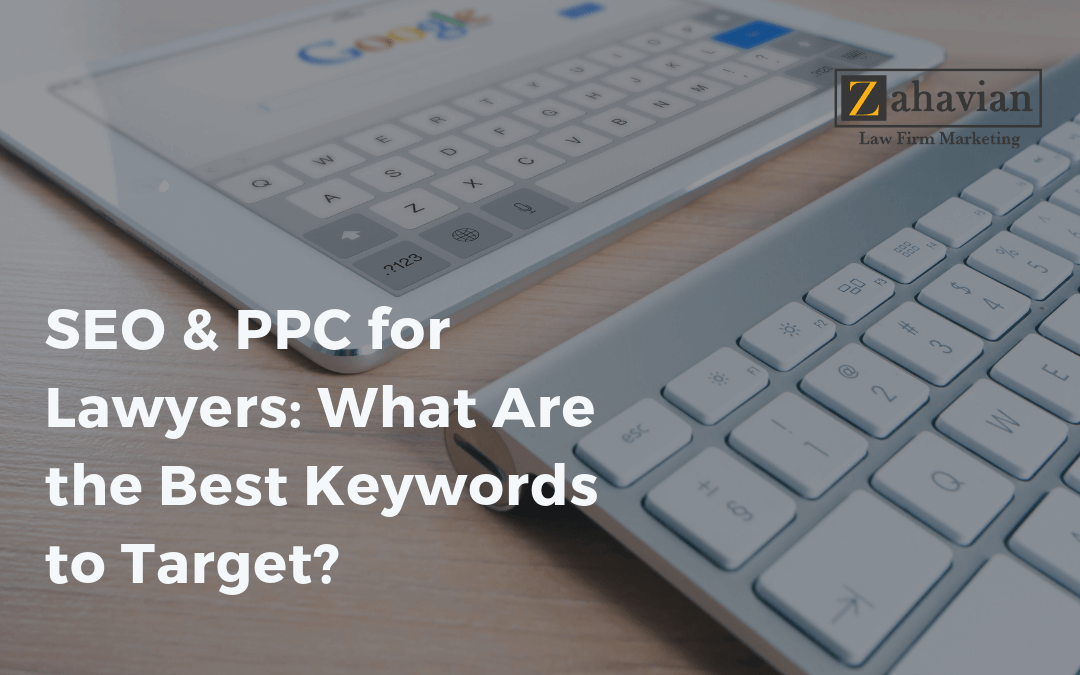Legal services is one of the most competitive local business industries paying for SEO and ads online. Search engines like Google and Bing are a lucrative channel for attorneys looking to secure to leads and sign up new clients. The key to search engines is knowing what keywords people are using to search for lawyers and legal information regarding their cases.
So what are the best keywords for lawyers to target? There are 2 main categories of keywords for firms to target in search. First are short keywords with high volume, to rank web pages in organic results and PPC ads. The second are long query, low volume, best suited for blogs answering specific legal questions.
That provides a general rule based on some simple technical principles of how people use search engines. High volume keywords tend to be shorter, since fewer keywords result in fewer combinations of keywords being strung together in a search. The opposite is true of long tail keywords, where the search query performed by a person is generally looking for answers in regards to a specific legal question.
Keywords Lawyers Should Target for SEO & PPC
Short Keywords are for High-Intent, Ready to Hire
As mentioned earlier, there are two main types of keywords. The first are shorter keywords usually associated with higher search volumes. To be more clear, these are search terms that people are likely to type in when they’re looking directly for a lawyer to contact, or maybe a list of lawyers to compare before hiring. In this article, we’re looking specifically at these keywords. They will be the primary keywords your firm either wants to rank for or, pay to have paid ad listings displayed above the organic search results in Google or Bing.
Target search terms will likely include keywords such as:
- Lawyer
- Attorney
- Law firm
- Law office
- Attorney at law
- Free legal advice
- Lawyer free consultation
These keywords, when combined with local and legal modifiers will narrow your search to a visitors with much clearer intent. Local modifiers include:
- Near me
- In my area
- “City”
- “State / Province”
When combined – either pre- or appended to the legal keywords above will give you searchers looking for lawyers in your specific area. Keywords like “city and “state” are to be replaced with your target market, and can either appear before or after the rest of the keywords in the search query.
Finally, using keywords specific to your area of practice will narrow down the traffic intent you drive to your website.
| Personal Injury | Criminal Defense & DUI | Family & Divorce Law | Immigration | Corporate & Business Law | Property / Real Estate | Wills & Estates |
| injury | criminal | family | Immigration | business | Real estate | will |
| Personal injury | Criminal defense | Family law | United states immigration | Employment lawyer | property | wills |
| Car accident | Dui | divorce | Us immigration | entertainment | Residential real estate | Wills and estates |
| Auto accident | Impaired driving | Child support | Canadian immigration | Workplace harassment | realtor | estate |
| Truck accident | Traffic ticket | Child custody | citizenship | Constructive dismissal | residential | Estate probate |
| mesothelioma | Traffic ticket defense | Spousal support | Online immigration | commercial litigation | Property tax | Last will and testament |
| disability | Domestic assault | Common law separation | visa | Employment contract | Property tax assessment | Contest will |
| Disability insurance | Domestic violence | Uncontested divorce | H1b visa | technology | ||
| insurance | Grand larceny | Contested divorce | O2 visa | |||
| Insurance claim | assault | E3 visa |
Now you have all the necessary pieces required to determine the keyword combinations you’re most likely going to desire targeting for SEO and PPC purposes. Below will be several example so you can see how this works.
Keyword examples of personal injury lawyer in Toronto:
- Car accident lawyer toronto
- Toronto auto accident lawyer
- Toronto disability lawyer free consultation
- Injury lawyer free legal advice toronto
- Lawyer for car accident toronto
Keyword examples of family lawyer in Connecticut:
- Connecticut family lawyer
- Divorce lawyer ct
- Child support attorney near me
- Connecticut lawyer for contested divorce
- Common law separation lawyer ct
These examples illustrate the number of combinations of keywords that people are searching for. As mentioned several times, these are among the shorter queries that display a higher intent to research, find, compare or hire a lawyer. Search engines like google are constantly changing the results for a given keyword to match the intent of the searcher.
By typing in “divorce lawyer ct”, there are ads, local listings and organic results.
Scrolling down further on the page to the organic listings, almost all of the results are divorce lawyer websites or directories with more Connecticut divorce lawyers. This clearly matches a search intent that users are looking for a divorce lawyer in CT.
What’s more is you may notice that keywords like free legal advice and free consultation are on the list. In some areas of law, like civil litigation (personal injury and insurance claims), it’s standard practice to offer free consultations as a way to sign up more clients. Other areas like family, business and criminal law, it’s less common, but still a popular practice that can be implemented into a firm’s business model.
It’s ultimately up to you whether you’re going to offer and therefore target these keywords. However, be advised that these terms receive a lot of online traffic in almost every area of law.
What about Long-Tail Keywords?
Long-tail keywords are simply longer search queries. As demonstrated above with the combinations of keywords, there are many combinations. As the number of keywords in a search query are added, the complexity, number of combinations and specificity increases. Longer keywords are perfect for discovering blog topics to write about.
While blogs will rank for keywords that have much lower search volume, there may be many different ways to ask the same question and hence many different searchers using different queries, but with the intent of finding the same type of resource. This is illustrated in the chart above. Someone may phrase the question about whether benefits are taxable with or without the state. Others may phrase it as “do i have to include disability benefits as income on my tax return in ct?”.
There are nearly countless ways to phrase such a specific question. Provided the article or blog post adequately satisfies the query, it can rank for many if not all of these synonymous long-tail keywords.
Why Should Lawyers Run Google Ads on Shorter Keywords?
Shorter keywords, as discussed above are more likely to demonstrate intent for researching or contacting a lawyer immediately. These searchers are near the end of the funnel and are more likely to convert on a keyword like “disability lawyer ct” than they are on a longer keyword phrase such as “are disability benefits taxable in ct”.
If your firm were to advertise for long-tail keywords, you’ll be reaching people who are closer to the top of the funnel (i.e. the research phase). People performing a long-tail query who click on your ad would be dissatisfied with the resulting page, which doesn’t fulfill their question (search query). This means they’re more likely to bounce (leave your page) and go back to Google to find a more relevant result that answers their question. This will result in a lot of wasted budget.
It’s better to focus your practice’s ad budget on shorter keywords, where search intent is much clearer and ad placement is easier to control.
Is it Better to Rank for Short or Long-Tail Keywords?
It’s always appealing for law firms to want to rank for their target, short phrase keywords like “personal injury lawyer toronto”. However, this can take a long time. Every competitor in your city that has been engaging SEO services for a while is likely far ahead of firms that have not. Especially the larger and more competitive the market.
While these shorter keywords may be a good investment for PPC ads above the organic and local map results, it could take 6-12 months to see rankings for these shorter, highly-competitive keywords.
However, there are many long-tail keywords that can be answered through blogging and helpful, long form how-to articles and guides. It’s much easier to find competition gaps in these long-tail search queries, where competitors haven’t written content to satisfy these queries. These types of opportunities can drive a substantial amount of traffic to your site.
When the right keywords and topics are selected, a significant portion of this traffic could end up converting into intakes and new clients. This guide on personal injury lawyer blog topics focuses specifically on injury and insurance topics, but lawyers in other areas of practice can see how the same concepts can be applied to their areas of law.
Related Questions
What topics should lawyers blog about? Topics to blog about ultimately depend on the blog’s objective. Lawyers seeking press and media attention should write about their noteworthy case results and professional opinions on trending legal issues and cases. To attract clients, respond to their legal questions in posts.
For more information on a comprehensive list of blog topics and ideas for law firms, check out these 17 blog ideas for lawyers.
How can firms measure their SEO and Blogging Success? Whether in-house or through agency contract, law practices can use free tools such as Google Analytics and Search Console to see reports on how much traffic their website and blog posts are driving, including which channels and search terms are driving visitors.


